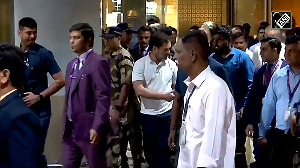In the event, the BJP emerged with a near two-thirds majority, bagging 117 seats, while the Congress and its allies were halted at 62. In Delhi, the Congress spokesman was quick to repudiate that Sonia Gandhi's infamous maut ke saudagar speech had anything to do with the party's defeat, seeking to protect the presiding deity of 10 Janpath from carping criticism. But the fact remains that in the battle for Gujarat, Narendra Modi has triumphed over Sonia Gandhi -- this is clearly Modi's victory more than that of the BJP.
Popular myths have been demolished and demons slain in this election. For instance, the BJP hesitated to act against party dissidents led by Keshubhai Patel, fearing a rebellion among the rank-and-file party workers. Some senior leaders in Delhi were hoping to put Modi in his place by letting the dissidents play spoilsport. Sunday's result shows that dissidence has had minimal impact on the BJP's vote share, which could be anything between 50 and 51 per cent, up from its share of 49.5 per cent in 2002.
In Saurashtra and south Gujarat, where exit polls had predicted an erosion of BJP support on account of Patels feeling slighted by the party ignoring Keshubhai Patel, the party has done far better than expected. The ageing man who aspired to lead Gujarat again now finds himself, along with the likes of Suresh Mehta, in splendid isolation.
Surprisingly, the BJP has suffered reverses in central Gujarat, where it was expected to perform better than in south Gujarat and Saurashtra. The Congress appears to have regained ground it had ceded after the post-Godhra riots of 2002. But clearly the recovery has been far from that which would have helped it pose a serious challenge to the BJP for the masnad (throne) of Gandhinagar. The BJP's net loss is 10 seats; the net gain of the Congress and its allies, namely the Nationalist Congress Party, has been seven seats. Congress spinmasters can't even claim a pyrrhic victory.
What this election has also demonstrated is that caste ceases to be a dominant factor when economics takes centrestage. The Congress tried to recreate the magic of KHAM (Kshatriya Harijan Adivasi Muslim) by selecting candidates with the right caste and community identity, creating some amount of concern among traditional election strategists in the BJP. The Congress's strategy has come a cropper.
Similarly, tribals, contrary to what pundits have been claiming in the media, have not shifted their loyalty en masse to the Congress. What should worry the Congress the most is Sonia Gandhi's failure to draw woman voters. Modi would not have been triumphant had women, irrespective of their age and social and economic status, not voted for him, their Chhappan ni Chhaati (Modi's reputed 56-inch chest), in vast numbers.
Contrary to popular impressions outside Gujarat, this election was about neither Hindu nationalism nor Congress secularism. It was a referendum on Modi's economic agenda which does not have a populist component. When the BJP election manifesto was being drafted, insiders say, there was a strong suggestion that it should mention an offer of amnesty for farmers who had defaulted on paying their electricity bills and against whom cases had been registered. Modi is believed to have given a patient hearing to his party colleagues and then put his foot down. He would not compromise on his policies. He took the issue to the people and they have voted in his favour.
As have the young voters of Gujarat. They see in Modi a doer, a leader who delivers on his promises rather than feather his nest. In our national political scene dominated by cynical politicians, who are seen as having their snouts in the trough and clamouring to clamber onto the gravy train, Modi has crafted an image of probity and integrity for himself. He is honest and his honesty is so transparent that it carries conviction with the masses.
Lessons to be learned: Cynicism does not necessarily fetch votes, nor does mindless populism. Good governance, strong leadership and a squeaky clean image now command a premium.
This does not mean all is fine and Modi, having made a record of sorts by becoming the longest serving chief minister of Gujarat (and the BJP), bucking anti-incumbency and winning two elections in a row, thumbing his nose at Sonia Gandhi and the Cassandras within and outside the BJP who delighted in predicting his fall, can now rest on his laurels. The mass hysteria he generates demonstrates the popular adulation and admiration he commands. But it is also an indicator of soaring popular expectations.
Prosperity breeds a certain hunger for more, in both cities and villages, and Modi will now have to step on the development accelerator.
There is no percentage in pondering over whether the BJP has been overshadowed by Modi's larger-than-life image. The party would not have acquired a cutting edge and made the quantum leap required to acquire power at the Centre in 1998 and 1999 had it not projected Atal Bihari Vajpayee. If those two victories were on account of Vajpayee's charisma and mass appeal, Sunday's win is due to Modi's mesmerising public persona. If the party was comfortable with Vajpayee getting the votes in 1998 and 1999, there is no reason for it to feel discomfited by Modi doing a repeat performance in Gujarat in 2007.
Idols, let's be honest, are better vote-getters than ideology.
At his brief thanksgiving speech on Sunday, Modi repeatedly praised 'five-and-a-half crore Gujaratis' for the BJP's victory. He talked about Gujarat celebrating its golden jubilee in 2010 and how every Gujarati should work for Gujarat's golden future. He pledged to work for the 'salamati (wellbeing)' of all 'five-and-a-half crore' Gujaratis. Which means, he has to ensure three things.
First, every policy and programme of his government has to be inclusive and focus on every section and segment of Gujarati society.
Second, he has to build upon the record of the last five years during which Gujarat remained peaceful and Gujaratis were provided with security. There were no riots, a first for Gujarat (look up its history of riots while under Congress rule), no terrorist strikes and no major social upheavals. Maintaining this record can prove to be an awesome task.
Third, the prosperity that is so evident in Gujarat has to percolate down. There are still large sections of people who are yet to be touched by 'Jeetega Gujarat'.
Six years as chief minister has allowed Modi to acquire administrative skills; he is clearly a more mature man today than, say, in 2002. Sunday's result has provided him with an opportunity to put that maturity and those skills into practice.
Kanchan Gupta is Associate Editor of The Pioneer newspaper.






 © 2025
© 2025